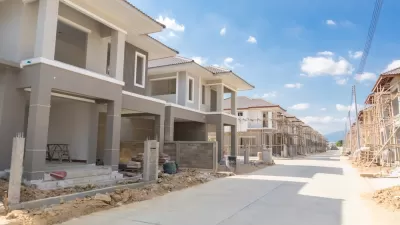As communities across the country work to address massive housing shortage and affordability issues, a new guide from the American Planning Association and the National League of Cities can help decision-makers chart a clear path forward.

The American Planning Association, in partnership with the National League of Cities, recently released a free playbook for local elected officials and planners who are looking to boost the supply of housing in their communities. The 92-page “Housing Accelerator Playbook” outlines current, multi-pronged housing supply and affordability challenges faced by cities, towns, and villages across the United States — including construction, finance, land use regulations, and infrastructure — outlines a systems approach to address them, and provides a bevy of actionable strategies and real-life case studies to help communities chart their own paths forward.
In its own words, the playbook is “meant to serve as a starting point for engagement and alignment through public-private partnerships to produce attainable and locally driven plans of action that account for differences in local capacities and market conditions.” Within this resource, APA and NLC have compiled a wealth of expertise and thought leadership to offer a menu of effective strategies from which elected officials and local planners can choose according to their communities’ unique situations and needs. If you are a local housing policy decision-maker and haven’t already checked this resource out, it is definitely worth a gander.
FULL STORY: Housing Supply Accelerator Playbook Provides Solutions for Addressing Nation’s Housing Supply Crisis

Planetizen Federal Action Tracker
A weekly monitor of how Trump’s orders and actions are impacting planners and planning in America.

Restaurant Patios Were a Pandemic Win — Why Were They so Hard to Keep?
Social distancing requirements and changes in travel patterns prompted cities to pilot new uses for street and sidewalk space. Then it got complicated.

Map: Where Senate Republicans Want to Sell Your Public Lands
For public land advocates, the Senate Republicans’ proposal to sell millions of acres of public land in the West is “the biggest fight of their careers.”

Maui's Vacation Rental Debate Turns Ugly
Verbal attacks, misinformation campaigns and fistfights plague a high-stakes debate to convert thousands of vacation rentals into long-term housing.

San Francisco Suspends Traffic Calming Amidst Record Deaths
Citing “a challenging fiscal landscape,” the city will cease the program on the heels of 42 traffic deaths, including 24 pedestrians.

California Homeless Arrests, Citations Spike After Ruling
An investigation reveals that anti-homeless actions increased up to 500% after Grants Pass v. Johnson — even in cities claiming no policy change.
Urban Design for Planners 1: Software Tools
This six-course series explores essential urban design concepts using open source software and equips planners with the tools they need to participate fully in the urban design process.
Planning for Universal Design
Learn the tools for implementing Universal Design in planning regulations.
Heyer Gruel & Associates PA
JM Goldson LLC
Custer County Colorado
City of Camden Redevelopment Agency
City of Astoria
Transportation Research & Education Center (TREC) at Portland State University
Camden Redevelopment Agency
City of Claremont
Municipality of Princeton (NJ)





























